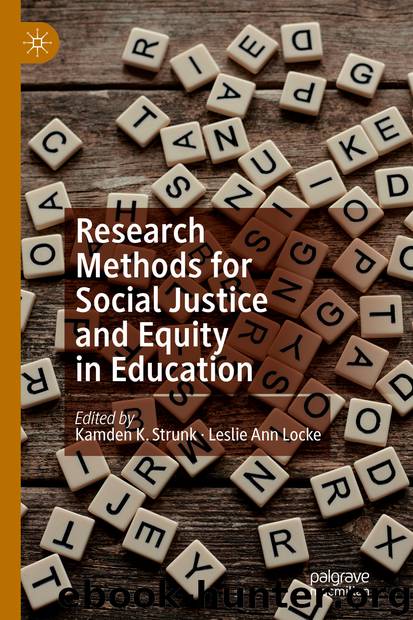Research Methods for Social Justice and Equity in Education by Kamden K. Strunk & Leslie Ann Locke

Author:Kamden K. Strunk & Leslie Ann Locke
Language: eng
Format: epub
ISBN: 9783030059002
Publisher: Springer International Publishing
Policy Discourse Analysis: Implications for Practice
An example of how a PDA study yields findings to inform social justice practice can be seen in Tolbert’s (2017) study, where five dominant discourses were traced relative to developmental education policy. A narrative chain pervaded the documents shaped by dominant discourses of crisis, accountability, efficacy, standardization, and policy fiat. Critically, these dominant discourses were seen as working through interdiscursivity, with the effect of producing pejorative subject positions for both students and faculty involved with developmental education. Developmental students were positioned either as encumbering society with the cost of their education for a second time, implicitly wasting taxpayer dollars, or as maligned, as harmed by an ineffective and broken developmental education system. Likewise, faculty were framed as “prosaic” through dominant policy discourses where their outdated teaching philosophies and pedagogies were to blame for poor student outcomes with the implication that faculty needed to be managed by college administrators or policymakers themselves. These findings are supported by the work of Parker, Barrett, and Bustillos, 2014.
Tolbert’s (2017) study revealed that dominant discourses framed developmental education as a broken system that was harming students and keeping them from attaining their college degrees. The dominant discourses in the policy briefs can be said to have, in part, produced problems with developmental education by simplifying the issues. The dominant discourses tended to oversimplify and thus eclipse highly contested and complex debates about the potential merits and drawbacks of development education (Goudas & Boylan, 2012).
The idea that developmental students “encumber” society has moved throughout discursive landscapes since the 1990s when blaming students for the cost of remediation was prominent in policy debates (Soliday, 2002). Against the backdrop of this discursive landscape, the CUNY system implemented a policy mandating that developmental education would be limited to two-year institutions (Soliday, 2002), thereby creating a tiered system as a greater proportion of racially minoritized students were identified as needing developmental education (Parker & Richardson, 2005) and thus funneled to associate granting institutions. Analysis of policy silences reveals another impact of this discursive history where cultural capital or community cultural wealth (Yosso, 2005) of minoritized students is overlooked when dominant discourses frame developmental students as deficient.
Numerous other applications of PDA exist in scholarly literature. For example, Bertrand et al. (2015) used PDA to understand policy insiders’ discursive strategies for engaging with racism and class when discussing education, finding that in relationship to deficit discourses, “naturalization” occurred “which Bonilla-Silva (2014) described as the practice of explaining away systemic racism as a natural occurrence” (Bertrand et al., 2015, p. 21). In a study of diversity action plans, Iverson (2012) described how dominant discourses of access shape these policy documents and points to the need to “resist and contest dominant conceptions of diversity” (p. 168) that tend to homogenize difference and reinforce the status quo. Allan’s (2008) study of university women’s commission reports underscored how dominant discourses of gender reinscribe images of women as vulnerable outsiders to the institution and how policy solutions were shaped in response to these images.
Download
This site does not store any files on its server. We only index and link to content provided by other sites. Please contact the content providers to delete copyright contents if any and email us, we'll remove relevant links or contents immediately.
The Secret History by Donna Tartt(16622)
The Social Justice Warrior Handbook by Lisa De Pasquale(11489)
Thirteen Reasons Why by Jay Asher(7788)
This Is How You Lose Her by Junot Diaz(5770)
Weapons of Math Destruction by Cathy O'Neil(5036)
Zero to One by Peter Thiel(4824)
The Myth of the Strong Leader by Archie Brown(4789)
Promise Me, Dad by Joe Biden(4447)
Beartown by Fredrik Backman(4415)
Stone's Rules by Roger Stone(4415)
How Democracies Die by Steven Levitsky & Daniel Ziblatt(4398)
The Fire Next Time by James Baldwin(4342)
100 Deadly Skills by Clint Emerson(4076)
A Higher Loyalty: Truth, Lies, and Leadership by James Comey(4032)
Rise and Kill First by Ronen Bergman(4012)
The David Icke Guide to the Global Conspiracy (and how to end it) by David Icke(3881)
The Farm by Tom Rob Smith(3872)
Secrecy World by Jake Bernstein(3782)
The Doomsday Machine by Daniel Ellsberg(3730)
